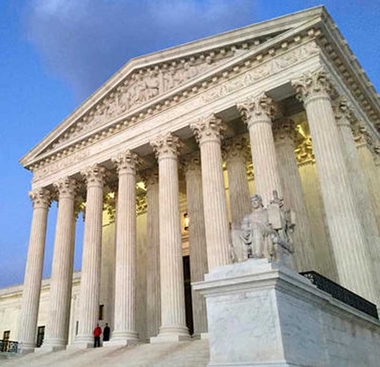Why It Matters: Supreme Court

Washington (Ap) — The Issue: No one likes an even number on a court that makes decisions by majority vote. Yet that's just what the Supreme Court has been left with, eight justices, since the death of Antonin Scalia in February.
Four cases ended in a tie after Scalia's death. With Senate Republicans refusing to confirm President Barack Obama's choice to succeed Scalia, the outcome of the presidential election will determine whether the ninth, tie-breaking justice moves the court right or left. How much can one vote matter?
In key decisions in recent years on health care, gun rights, same-sex marriage, voting rights and campaign finance, the vote was 5-4. And more Supreme Court appointments probably await the next president because two justices will be older than 80 and a third will be 78 come Election Day.
___
Where they stand
Both Democrat Hillary Clinton and Republican Donald Trump have made the future of the Supreme Court part of their pitch to their respective party faithful. In talking about the court, Clinton has stressed her support for abortion rights, LGBT issues and immigration. Trump has released a list of 11 conservative state and federal judges whom he would consider nominating if elected.
___
Why it matters
The current vacancy is the moment both sides alternately have wished for and feared. Supreme Court nominations are always important because a justice can serve a quarter century or more. But the stakes are even higher when the president has a chance to put a like-minded justice on the court to take the place of an ideological opponent. Such a switch can change the outcome of some of the court's most important cases.
That's the tantalizing opportunity for Democrats and why Republicans have been resolute in refusing to consider Obama nominee Merrick Garland. Though Garland has a reputation as a moderate, he still would be left of Scalia on most issues.
A Clinton victory in November would, with the confirmation of Garland or someone else as the ninth justice, immediately shift the court to the left and result in a majority of justices nominated by a Democratic president for the first time since 1969.
If Trump is elected, he presumably would restore the court's conservative tilt by appointing a like-minded successor to Scalia.
So the direction of a court closely divided between conservatives and liberals is at stake. The Supreme Court may be the least understood of the three branches of government, but its decisions affect Americans rich and poor.
A switch of one vote would have doomed Obama's health care overhaul in 2012, kept the heart of a voting rights law in place in 2013 and prevented some Americans from marrying their same-sex partners in 2015.
Chances are Trump or Clinton will have other Supreme Court vacancies to fill, nominations that could cement conservative or liberal domination of the court for decades.
Justice Ruth Bader Ginsburg is 83, Justice Anthony Kennedy is 80, and Justice Stephen Breyer is 78. Justices tend to retire when their replacement is likely to be of similar ideology.
Garland or another Democratic nominee could be expected to reinforce support for abortion rights, look favorably on executive actions to deal with immigration and climate change and be more willing to uphold campaign finance restrictions. Trump's choices probably would come down on the other side of those issues and be more skeptical about gun control and consideration of race in higher education as well.
By Mark Sherman, Associated Press. Copyright 2016 The Associated Press. All rights reserved. This material may not be published, broadcast, rewritten or redistributed.
The Gayly – August 24, 2016 @ 7:25 a.m.





